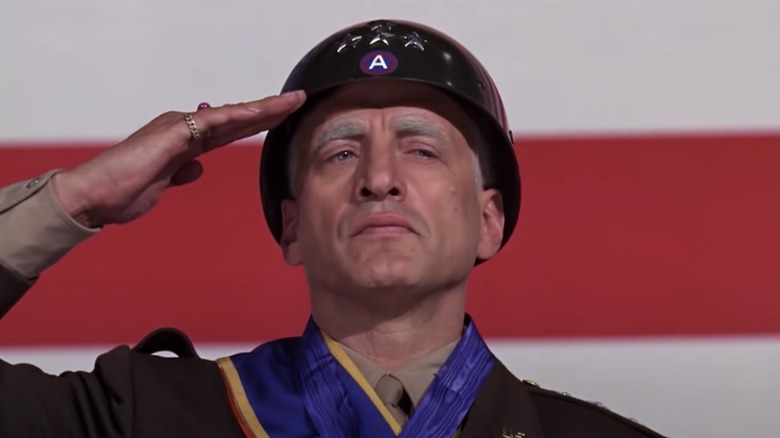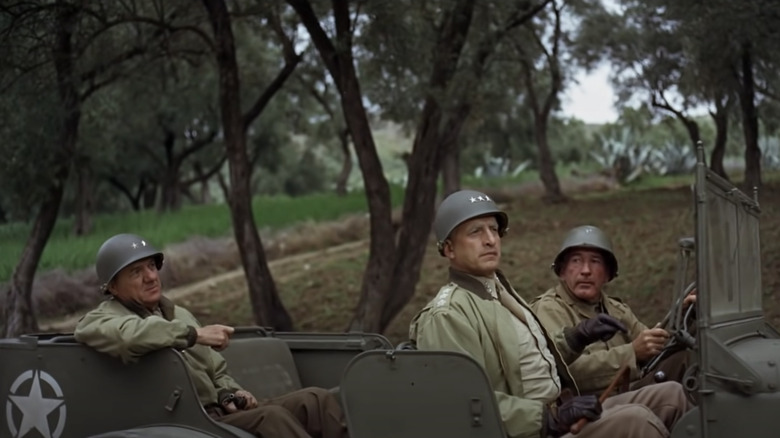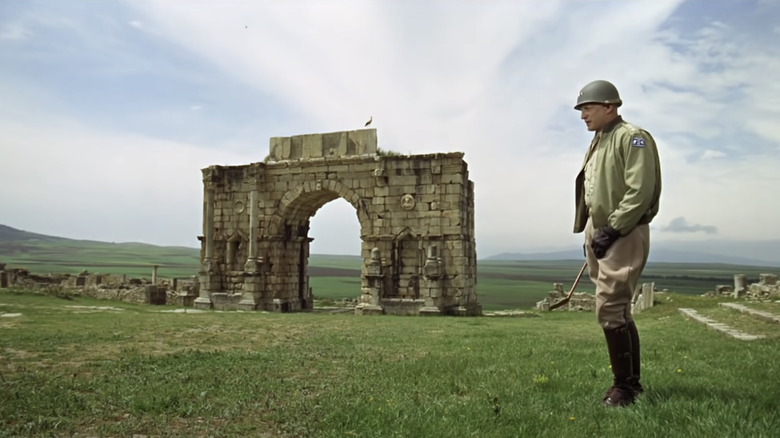Francis Ford Coppola Found His Patton Script Was Used In The Most Unusual Way
Francis Ford Coppola won his first Oscar in 1971 for writing "Patton," but he was not involved with the film's production and it came as a surprise when he first learned that it had been made. Coppola wrote the script for the movie in 1963, based on two books, Omar Bradley's "A Soldier's Story" and Ladislas Farago's "Patton: Ordeal and Triumph." The latter was a biography of U.S. World War II General George S. Patton which had been published that year. It was not until several years later, however, that the script would make it through development and become a movie starring George C. Scott.
By that time, Coppola had long since exited the picture. He was not even aware that his script had been revived and filmed since he had effectively been fired already by losing his contract.
In a 2022 interview with Deadline, Coppola explained how he originally landed the "Patton" writing gig from producer Frank McCarthy, himself a former brigadier general, because of his nominal "experience." He was in the Writers Guild, had co-written a film with Gore Vidal called "Is Paris Burning?," and had briefly attended military school. This was enough to secure him the job, at which point he threw himself into the research for "Patton" and struck upon the idea for the famous opening scene, where the general speechifies on stage in front of a massive American flag. He explained:
"I came up with a unique approach, two ways. I wanted the general to appear, walk right up to the audience, and be in all of his splendor, General Patton. I wanted someone to say 'A Ten Hut.' I wanted them to play 'The Star-Spangled Banner' because I wanted the whole audience to stand up. I loved the idea that the first scene of Patton would be like the audience was his men. The guy who directed [Franklin J. Schaffner] did a great job, in my opinion, but of course they decided not to play 'The Star-Spangled Banner,' so the audience didn't stand up. They played 'Taps,' which you play when you lower the flag."
Coppola's 'unique approach' got him booted
Though it's now regarded as a classic movie scene, Coppola's idea for the opening of "Patton" was not popular with everyone. Before Scott came on board, a number of other well-known actors were courted to play Patton, and some of them had their own ideas about how this biopic should go.
According to Turner Classic Movies, Rod Steiger, Lee Marvin, John Wayne, Robert Mitchum, and Burt Lancaster all eventually turned down the Patton role. Lancaster was in the running while Coppola was still involved with the project, but he was more interested in showing Patton's humble beginnings at the movie's outset. As Coppola tells it, Lancaster "didn't understand why I just hit the audience in the face with him as a two-star general."
At that point, Coppola was still in his early-to-mid-20s, years off from directing "The Godfather" (another movie where he almost got fired), so his opinion did not hold as much sway as Lancaster. The "From Here to Eternity" star was fresh off his third Oscar nomination in 1963 for "Birdman of Alcatraz," and another sticking point for him with Coppola's "Patton" script was the element of reincarnation.
This is one of the more memorable aspects of the final film, thanks in part to Jerry Goldsmith's musical score, which uses looping trumpets to evoke the sensation of Patton's past-life memories coming back to him. However, Lancaster found it off-putting. Coppola explained further how this led to his removal from the project as screenwriter, saying:
"[Lancaster] didn't like all the implications of reincarnation I put in, which were true. Patton was an interesting man, and he believed that his spirit had been alive when Napoleon invaded, so when he saw the Nazis retreating from Russia, he felt that he had been there. So, in other words, he believed he had been reincarnated from a previous warrior. Burt Lancaster didn't like that, so basically they fired me. They don't fire you in the movies. They didn't pick up my contract, so I was out. So George Lucas and I went to San Francisco and I forgot about it."
Coppola's script was soon reincarnated like Patton
Years later, Coppola had moved on from "Patton," and he and George Lucas, the future director of "Star Wars," were eking out a living renting out editing machines, which landed him back at 20th Century Fox — in the capacity of a repairman for one of his own machines. He said:
"We had no money. We were really on the verge of going out of business. So, we would live by renting these machines and one was rented to Fox. We got a call that it was broken, send a repairman. Of course, there was no repairman, so I went down. It really wasn't broken. They were threading it wrong. I threaded it right and said look, here. Then I saw the scenes that I recognized from my script. I said what is this movie? They said this is Patton. I looked at it. What had happened is, Lancaster didn't do it and later they hired George C. Scott and he didn't like the script they had written for Lancaster."
This is how Coppola inadvertently found out that his script for "Patton" was back in use. Fox was the production company behind "Patton" and its distributor, but apparently, since Coppola had penned the script as a work-for-hire, the studio was under no obligation to notify him of its status. He only saw footage of it through the wild coincidence of someone jamming up a machine, not knowing that the guy there to repair it was the same guy who wrote the movie it was playing.
Coppola wound up sharing his Oscar for Best Adapted Screenplay for "Patton" with Edmund H. North ("The Day the Earth Stood Still"), who was brought on after him to work on the script. While producer David Brown did not receive a credit on the film, it was thanks to his recommendation that Coppola's old script was salvaged after the rewrite for Lancaster fell by the wayside.
The opening scene of "Patton" and its reincarnation plot thread remain two of the movie's most well-known, distinguishing features. Coppola's experience just goes to show that even the most talented writers and directors have had to deal with gatekeepers in Hollywood. Thankfully, Coppola's script, like the Patton character, was reincarnated, paving the way for the rest of his career as the reigning king of cinema in the 1970s.


